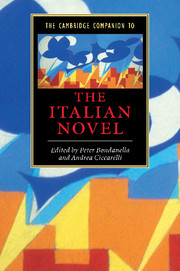Book contents
- Frontmatter
- 1 The belated development of a theory of the novel in Italian literary culture
- 2 The forms of long prose fiction in late medieval and early modern Italian literature
- 3 Alessandro Manzoni and developments in the historical novel
- 4 Literary realism in Italy
- 5 Popular fiction between Italian Unification and World War I
- 6 The foundations of Italian modernism
- 7 Neorealist narrative
- 8 Memory and testimony in Primo Levi and Giorgio Bassani
- 9 The Italian novel in search of identity
- 10 Feminist writing in the twentieth century
- 11 Italo Calvino and Umberto Eco
- 12 Literary cineastes
- 13 Frontier, exile, and migration in the contemporary Italian novel
- 14 The new Italian novel
- Index
- Series List
13 - Frontier, exile, and migration in the contemporary Italian novel
Published online by Cambridge University Press: 28 May 2006
- Frontmatter
- 1 The belated development of a theory of the novel in Italian literary culture
- 2 The forms of long prose fiction in late medieval and early modern Italian literature
- 3 Alessandro Manzoni and developments in the historical novel
- 4 Literary realism in Italy
- 5 Popular fiction between Italian Unification and World War I
- 6 The foundations of Italian modernism
- 7 Neorealist narrative
- 8 Memory and testimony in Primo Levi and Giorgio Bassani
- 9 The Italian novel in search of identity
- 10 Feminist writing in the twentieth century
- 11 Italo Calvino and Umberto Eco
- 12 Literary cineastes
- 13 Frontier, exile, and migration in the contemporary Italian novel
- 14 The new Italian novel
- Index
- Series List
Summary
The experience of reading a book written in Italian but conceived in a foreign cultural world is unusual in modern Italian literature. Such an experience, normal in the anglophone, francophone, and the Spanish-speaking world, has become less rare in the past decade thanks to a number of books written, often in cooperation with authors of Italian birth, by foreigners who have immigrated to Italy. Most of these books are in diary form and document the autobiographical struggles of Africans or East Europeans who travel throughout Italy or make Italy their new home. This phenomenon is in the process of evolution, but the literature it has already generated offers the promise of producing a body of work of great interest. Because of the current growth of the multicultural population in Italy, this kind of literature is destined to become a fixture of twenty-first-century Italian culture.
Even though the literary output of these new immigrants might not yet have created an enormous body of work or vast outpourings of scholarly analysis, the cultural impact of this new wave of non-Italian migratory tales written in Italian has provoked rethinking about the concepts of migration, exile, and frontier literature in Italian culture. Up to the 1990s, Italian scholarship had rarely perceived the themes of migration and frontier as two faces of the same literary phenomenon.
- Type
- Chapter
- Information
- The Cambridge Companion to the Italian Novel , pp. 197 - 213Publisher: Cambridge University PressPrint publication year: 2003



